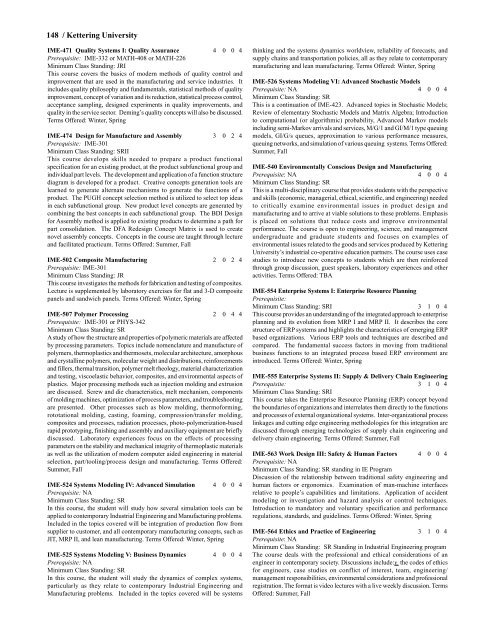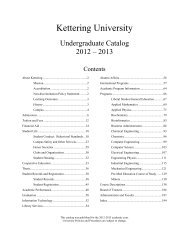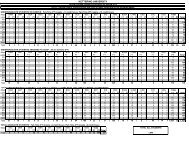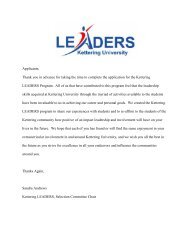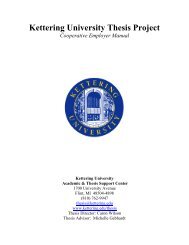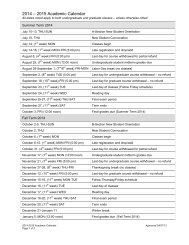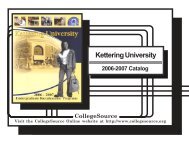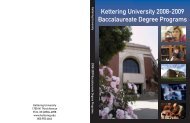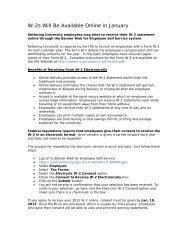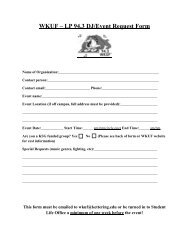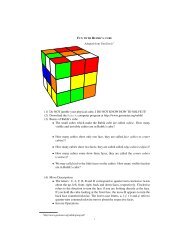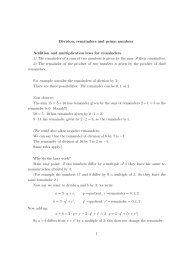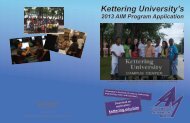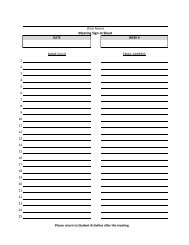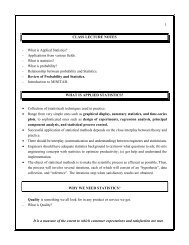2007-2008 Undergraduate Catalog - Kettering University
2007-2008 Undergraduate Catalog - Kettering University
2007-2008 Undergraduate Catalog - Kettering University
You also want an ePaper? Increase the reach of your titles
YUMPU automatically turns print PDFs into web optimized ePapers that Google loves.
148 / <strong>Kettering</strong> <strong>University</strong><br />
IME-471 Quality Systems I: Quality Assurance 4 0 0 4<br />
Prerequisite: IME-332 or MATH-408 or MATH-226<br />
Minimum Class Standing: JRI<br />
This course covers the basics of modern methods of quality control and<br />
improvement that are used in the manufacturing and service industries. It<br />
includes quality philosophy and fundamentals, statistical methods of quality<br />
improvement, concept of variation and its reduction, statistical process control,<br />
acceptance sampling, designed experiments in quality improvements, and<br />
quality in the service sector. Deming’s quality concepts will also be discussed.<br />
Terms Offered: Winter, Spring<br />
IME-474 Design for Manufacture and Assembly 3 0 2 4<br />
Prerequisite: IME-301<br />
Minimum Class Standing: SRII<br />
This course develops skills needed to prepare a product functional<br />
specification for an existing product, at the product subfunctional group and<br />
individual part levels. The development and application of a function structure<br />
diagram is developed for a product. Creative concepts generation tools are<br />
learned to generate alternate mechanisms to generate the functions of a<br />
product. The PUGH concept selection method is utilized to select top ideas<br />
in each subfunctional group. New product level concepts are generated by<br />
combining the best concepts in each subfunctional group. The BDI Design<br />
for Assembly method is applied to existing products to determine a path for<br />
part consolidation. The DFA Redesign Concept Matrix is used to create<br />
novel assembly concepts. Concepts in the course are taught through lecture<br />
and facilitated practicum. Terms Offered: Summer, Fall<br />
IME-502 Composite Manufacturing 2 0 2 4<br />
Prerequisite: IME-301<br />
Minimum Class Standing: JR<br />
This course investigates the methods for fabrication and testing of composites.<br />
Lecture is supplemented by laboratory exercises for flat and 3-D composite<br />
panels and sandwich panels. Terms Offered: Winter, Spring<br />
IME-507 Polymer Processing 2 0 4 4<br />
Prerequisite: IME-301 or PHYS-342<br />
Minimum Class Standing: SR<br />
A study of how the structure and properties of polymeric materials are affected<br />
by processing parameters. Topics include nomenclature and manufacture of<br />
polymers, thermoplastics and thermosets, molecular architecture, amorphous<br />
and crystalline polymers, molecular weight and distributions, reinforcements<br />
and fillers, thermal transition, polymer melt rheology, material characterization<br />
and testing, viscoelastic behavior, composites, and environmental aspects of<br />
plastics. Major processing methods such as injection molding and extrusion<br />
are discussed. Screw and die characteristics, melt mechanism, components<br />
of molding machines, optimization of process parameters, and troubleshooting<br />
are presented. Other processes such as blow molding, thermoforming,<br />
rototational molding, casting, foaming, compression/transfer molding,<br />
composites and processes, radiation processes, photo-polymerization-based<br />
rapid prototyping, finishing and assembly and auxiliary equipment are briefly<br />
discussed. Laboratory experiences focus on the effects of processing<br />
parameters on the stability and mechanical integrity of thermoplastic materials<br />
as well as the utilization of modern computer aided engineering in material<br />
selection, part/tooling/process design and manufacturing. Terms Offered:<br />
Summer, Fall<br />
IME-524 Systems Modeling IV: Advanced Simulation 4 0 0 4<br />
Prerequisite: NA<br />
Minimum Class Standing: SR<br />
In this course, the student will study how several simulation tools can be<br />
applied to contemporary Industrial Engineering and Manufacturing problems.<br />
Included in the topics covered will be integration of production flow from<br />
supplier to customer, and all contemporary manufacturing concepts, such as<br />
JIT, MRP II, and lean manufacturing. Terms Offered: Winter, Spring<br />
IME-525 Systems Modeling V: Business Dynamics 4 0 0 4<br />
Prerequisite: NA<br />
Minimum Class Standing: SR<br />
In this course, the student will study the dynamics of complex systems,<br />
particularly as they relate to contemporary Industrial Engineering and<br />
Manufacturing problems. Included in the topics covered will be systems<br />
thinking and the systems dynamics worldview, reliability of forecasts, and<br />
supply chains and transportation policies, all as they relate to contemporary<br />
manufacturing and lean manufacturing. Terms Offered: Winter, Spring<br />
IME-526 Systems Modeling VI: Advanced Stochastic Models<br />
Prerequisite: NA 4 0 0 4<br />
Minimum Class Standing: SR<br />
This is a continuation of IME-423. Advanced topics in Stochastic Models;<br />
Review of elementary Stochastic Models and Matrix Algebra; Introduction<br />
to computational (or algorithmic) probability, Advanced Markov models<br />
including semi-Markov arrivals and services, M/G/1 and GI/M/1 type queuing<br />
models, GI/G/s queues, approximation to various performance measures,<br />
queuing networks, and simulation of various queuing systems. Terms Offered:<br />
Summer, Fall<br />
IME-540 Environmentally Conscious Design and Manufacturing<br />
Prerequisite: NA 4 0 0 4<br />
Minimum Class Standing: SR<br />
This is a multi-disciplinary course that provides students with the perspective<br />
and skills (economic, managerial, ethical, scientific, and engineering) needed<br />
to critically examine environmental issues in product design and<br />
manufacturing and to arrive at viable solutions to these problems. Emphasis<br />
is placed on solutions that reduce costs and improve environmental<br />
performance. The course is open to engineering, science, and management<br />
undergraduate and graduate students and focuses on examples of<br />
environmental issues related to the goods and services produced by <strong>Kettering</strong><br />
<strong>University</strong>’s industrial co-operative education partners. The course uses case<br />
studies to introduce new concepts to students which are then reinforced<br />
through group discussion, guest speakers, laboratory experiences and other<br />
activities. Terms Offered: TBA<br />
IME-554 Enterprise Systems I: Enterprise Resource Planning<br />
Prerequisite:<br />
Minimum Class Standing: SRI 3 1 0 4<br />
This course provides an understanding of the integrated approach to enterprise<br />
planning and its evolution from MRP I and MRP II. It describes the core<br />
structure of ERP systems and highlights the characteristics of emerging ERP<br />
based organizations. Various ERP tools and techniques are described and<br />
compared. The fundamental success factors in moving from traditional<br />
business functions to an integrated process based ERP environment are<br />
introduced. Terms Offered: Winter, Spring<br />
IME-555 Enterprise Systems II: Supply & Delivery Chain Engineering<br />
Prerequisite: 3 1 0 4<br />
Minimum Class Standing: SRI<br />
This course takes the Enterprise Resource Planning (ERP) concept beyond<br />
the boundaries of organizations and interrelates them directly to the functions<br />
and processes of external organizational systems. Inter-organizational process<br />
linkages and cutting edge engineering methodologies for this integration are<br />
discussed through emerging technologies of supply chain engineering and<br />
delivery chain engineering. Terms Offered: Summer, Fall<br />
IME-563 Work Design III: Safety & Human Factors 4 0 0 4<br />
Prerequisite: NA<br />
Minimum Class Standing: SR standing in IE Program<br />
Discussion of the relationship between traditional safety engineering and<br />
human factors or ergonomics. Examination of man-machine interfaces<br />
relative to people’s capabilities and limitations. Application of accident<br />
modeling or investigation and hazard analysis or control techniques.<br />
Introduction to mandatory and voluntary specification and performance<br />
regulations, standards, and guidelines. Terms Offered: Winter, Spring<br />
IME-564 Ethics and Practice of Engineering 3 1 0 4<br />
Prerequisite: NA<br />
Minimum Class Standing: SR Standing in Industrial Engineering program<br />
The course deals with the professional and ethical considerations of an<br />
engineer in contemporary society. Discussions include:v the codes of ethics<br />
for engineers, case studies on conflict of interest, team, engineering/<br />
management responsibilities, environmental considerations and professional<br />
registration. The format is video lectures with a live weekly discussion. Terms<br />
Offered: Summer, Fall


